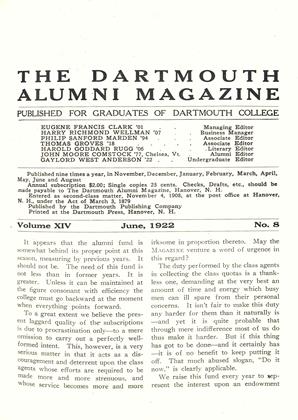To the Editor, Dartmouth Alumni Magazine
DEAR SIR : Dr. Arthur H. Ruggles' article on the Place of Mental Hygiene at Dartmouth has greatly interested me. It suggests two or three considerations about which I take the liberty of writing you.
In the first place the problem set for the new department of Mental Hygiene is not a new one, nor is its importance recognized for the first time. In the "small college," like Dartmouth before the last quarter of a century, it was one of the main problems of the real teachers and of the administrative officers; and it was recognized as such. When Dr. Ruggles
speaks of the "older method" "which was concerned principally with a group rather than the individual," he must be speaking of the serious danger which has somewhat recently been, threatening our whole educational system and in particular colleges that have grown large with extreme rapidity. I cannot forget that such men as President Angell of Michigan, criticized as he was for it, never gave up the effort to keep a personal touch with students who needed "psychopathic" advice; nor can I forget the teachers, who without an M. D. and without modern training in this particular field, were able to meet successfully the problem posed for the new department.
With the rapid growth of a college from 300 students to 3000 the problem of organization is excessively difficult because the organization must be manufactured instead of being gradually developed. Two processes have been at work. In some colleges the organization has been created to deal with the whole college or with large units, as is customary in an army or in a large industrial establishment. In other colleges the effort has been to decentralize the organization, so as to secure closer individual relations, very close individual relations, between small groups of students and some one of
his instructors. Neither course has been entirely successful. For one, however, I cannot escape the belief that for students as I have known them, the least valuable result of a college course is the result of the college organization as an educating machine, and the most valuable result is due to contact with one or more members of the faculty who have succeeded in touching them individually in the classroom or out of it. A department of mental hygiene which takes the responsibility for this work off other shoulders, away from men who have little or no professional fitness for it, but who have personal individual opportunities for it, may easily work harm rather than good to a college. The born teacher is, I believe, the best man to help the student in this as in other fields.
My second point is equally simple and familiar. Our college students today are only too ready to regard themselves as psychopathic patients. Self analysis is the order of the day for them. It governs their more intimate conversation; it is the element of interest in the stories they read; it occupies much of their thought. Religious self-examination' has been succeeded by a curious, prying self-examination that may be more morbid rather than less morbid than the earlier type. It is assumed that a professor of Mental Hygiene will release the student from such morbid impulses. The great difficulty is the reticence of the student toward a physician and particularly in matters that affect
the mind. To" be sent to such a physician immediately raises a barrier in the student's mind, and increases his morbid attitude. If all students are sent to him, it can hardly help increasing the general tendency to" self analysis. Moreover such a physician has no natural points of contact previously established with students, by which he can gain an influence over them. As against his asset of professional training and experience stand the student's reticence, and the student's aloofness from the physician. Granted that professional training may be necessary in dealing with acute cases, the value of such an adviser to the student body generally seems to me extremely doubtful; and the resulting tendency to shift responsibility, from teachers to such specialists seems to me more than doubtful.
In a word, there can be no question of the seriousness of the problem treated by Dr. Ruggles; the only question is how to deal with it as our colleges increase in size. In general the plan of decentralized handling of students, as against an elaborate organization in the hands of specialists seems to me the more promising, especially if it can be made to conserve some of what was finest in the old college.
 View Full Issue
View Full Issue
More From This Issue
-
 Article
ArticleANNUAL MEETING DARTMOUTH SECRETARIES ASSOCIATION
June 1922 -
 Sports
SportsBASEBALL
June 1922 -
 Article
ArticleIt appears that the alumni fund is somewhat
June 1922 -
 Article
ArticleNEW LIGHT ON WEBSTER AND HIS SEVENTH OF MARCH SPEECH
June 1922 By HERBERT D. FOSTER '85 -
 Books
BooksA Student's Philosophy of Religion
June 1922 By W. H. WOOD -
 Sports
SportsTRACK
June 1922
Letters to the Editor
-
 Letters to the Editor
Letters to the EditorSPRINGFIELD ALUMNI FAVOR CHANGE IN SEATING PLANS
February 1921 -
 Letters to the Editor
Letters to the EditorLetters
December 1939 -
 Letters to the Editor
Letters to the EditorLetters
January 1954 -
 Letters to the Editor
Letters to the EditorLetters
MAY 1957 -
 Letters to the Editor
Letters to the EditorLetters to the Editor
April 2000 -
 Letters to the Editor
Letters to the EditorLetters
Mar/Apr 2006


